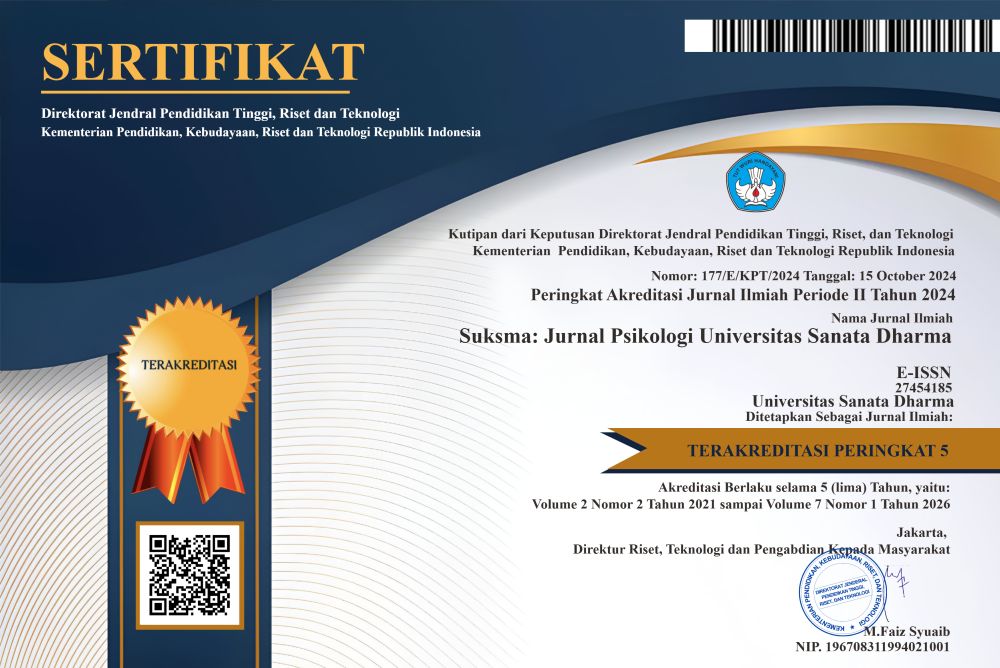Studi Kasus: Pengaruh Cognitive Behavior Therapy (CBT) pada Klien dengan Diagnosa Gangguan Afektif Bipolar
(1) Mercu Buana University Yogyakarta
(*) Corresponding Author
Abstract
Keywords
Full Text:
PDFReferences
Beck AT, Rush AJ, Shaw BF, Emery G. Cognitive therapy of depression. New York: Guilford Press, 1987.
Besenek, M. (2020). Psychiatric and psychological features of children at high-risk for bipolar disorder. Journal of Affective Disorders, 277, 104-108.
Cassidy, M. L. (1999). Friends and other strangers. State University of New York at Binghamton.
Chen, Y. C., Kao, C. F., Lu, M. K., Yang, Y. K., Liao, S. C., Jang, F. L., Kuo, P. H. (2014). The relationship of family characteristics and bipolar disorder using causal-pie models. European Psychiatry, 29(1), 36-43.
Davison, G.C & Neale J.M. (2004). Psikologi abnormal. PT. Raja Grafindo Persada.
Døssing, M., Nilsson, K.K., Svejstrup, S.R., Sørensen, V.V., Straarup, K.N. and Hansen, T.B., 2015. Low self-compassion in patients with bipolar disorder. Comprehensive psychiatry, 60, pp.53-58.
Evans D.L., (2000) Bipolar disorder: Diagnostic challenges and treatment considerations. J Clin Psychiatry,61(13);26-31.
Gonzalez‐Pinto, A., Gonzalez, C., Enjuto, S., Fernandez de Corres, B., Lopez, P., Palomo, J., ... & Perez de Heredia, J. L. (2004). Psychoeducation and cognitive‐behavioral therapy in bipolar disorder: an update. Acta Psychiatrica Scandinavica, 109(2), 83-90.
http://altcancerweb.com/bipolar/treatmentguidelines/treatmenyguidelines-bipolar-states- 2000.pdf pada 13 April 2023
KJ, M., Sinha, V. K., Bhattacharjee, D., & Rai, S. (2015). Parenting characteristics of families of adolescents with bipolar disorder.
Lahera, G., Ruiz-Murugarren, S., Iglesias, P., Ruiz-Bennasar, C., Herrería, E., Montes, J. M., & Fernández-Liria, A. (2012). Social cognition and global functioning in bipolar disorder. The Journal of nervous and mental disease, 200(2), 135-141.
Liese, B. S. (1994). Brief therapy, crisis intervention, and the cognitive therapy of substance abuse. Crisis Intervent Time-Limited Treat, 1, 11-29.
Miklowitz, D. J., & Chung, B. (2016). Family‐focused therapy for bipolar disorder: Reflections on 30 years of research. Family process, 55(3), 483-499.
Mruk, C. J. (2006). Self-esteem research, theory, and practice: Toward a positive psychology of self-esteem. Springer Publishing Company.
Özdel, K., Ayşegül, K. A. R. T., & Türkçapar, M. H. (2021). Cognitive behavioral therapy in treatment of bipolar disorder. Archives of Neuropsychiatry, 58(Suppl 1), S66.
Rector, N. A. (2010). Cognitive behavioural therapy: An information guide. Centre for Addiction and Mental Health.
Scott J, Paykel E, Morriss R, et al. Cognitive behaviour therapy for severe and recurrent bipolar disorders: a randomised controlled trial. Br J Psychiatry 2006; 188: 313–20.
Sharf, R. S. (2012). Theories of psychotherapy & counseling: Concepts and cases: Cengage Learning. Belmont, CA.
Steardo, L., Luciano, M., Sampogna, G. et al. Efficacy of the interpersonal and social rhythm therapy (IPSRT) in patients with bipolar disorder: results from a real-world, controlled trial. Ann Gen Psychiatry 19, 15 (2020). https://doi.org/10.1186/s12991-020-00266-7
Stuart, G., W. (2016). Prinsip dan praktik keperawatan kesehatan jiwa stuart. Elsevier
Swartz, H. A., & Swanson, J. (2014). Psychotherapy for bipolar disorder in adults: a review of the evidence. Focus, 12(3), 251-266.
Tohen M dan Angst J, 2002. Epidemiology of bipolar disorder. In MT Tsuang & Tohen M (Eds.), Textbook in Psychiatric Epidemiology second edition (pp. 427-447). John Wiley & Sons, Inc
Videbeck, S. L. (2011). Psychiatric-mental health nursing. William & Wilkins.
Vieta, E. Managing. (2013). bipolar disorder in clinical practice. 3 ed. Springer Healtcare.
Wijaya, H. M. (2018). Bipolar Disorder In John Green’s The Fault In Our Stars. Lingua Litera, 3(1), 53-65.
Wolpe, J. (1969). Subjective units of distress scale (SUDS) [Database record]. APA PsycTests. https://doi.org/10.1037/t05183-000.
DOI: https://doi.org/10.24071/suksma.v4i2.6271
Refbacks
- There are currently no refbacks.


